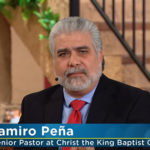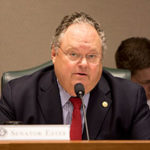Posted: 2/11/04
Peace in Israel requires 'transforming
initiative,' pastor tells Jewish group
By Craig Bird
Special to the Baptist Standard
SAN ANTONIO—Unequivocal support for Israel as "the last, best hope for democracy, justice, righteousness, liberty, dignity, and peace in a war-weary land" doesn't translate into automatic opposition to the legitimate needs and dreams of Palestinians, a Baptist pastor recently told a Jewish congregation.
Lasting peace will come to Jerusalem—or Gaza—only when people are faithful to the clear commandments of the God of Israel and honor the Jews' "gift of monotheism" to the world, Charles Johnson believes. And he cites the prophet Elisha as his witness.
| Rabbi Barry Block (left) and a member of Temple Beth-El greet Charles Johnson (right), pastor of Trinity Baptist Church in San Antonio. |
Rabbi Barry Block originally invited Johnson, pastor of Trinity Baptist Church in San Antonio, to speak at Temple Beth-El about "Why Christians Support Israel." But Block readily agreed when Johnson asked to enlarge to topic to "Why Christians Support Israel—and Care About Palestinians Too."
Block admitted the issue is emotional—which makes it all the more vital that people of good faith listen to and learn from each other.
"Truth be told, many Christians who love and support Israel oppose actions of the Israeli government that they feel are wrong," Block said. "And more truth be told, some Jews are not interested in hearing about the complications caused if the concerns of Palestinians are considered."
About 350 people, including numerous Jewish War Veterans wearing their JWV hats and a scattering of Baptists, attended the Shabbat service. Congregational prayers, responsive readings and songs accepted Johnson's message during the 90-minute service.
"Wholeheartedly" affirming his solidarity with the state of Israel, Johnson distanced himself from those whose support for Israel "seems to be predicated on the condemnation—even eradication—of Palestinians.
"Perhaps it is easier to get worked up into a rampage of division than to be reasoned into a path of peace," he noted. "But we all know in our hearts which choice the God of Israel would have us make."
The world—and Christians—are indebted to Israel for the unifying principle of monotheism—a "wonderful vision of the Fatherhood of God" to replace the regional, nationalistic and naturalistic gods "created in the image of human passions and apprehensions" which "fomented division, disunity and fear," Johnson said.
"Israel was the first to understand that we all spring from the same source, we are all brothers and sisters," he explained, decrying an "insidious teaching coming, God forbid, even from some Christian pulpits that folks of other faiths do not seek the same God that Christians seek. We see preachers in America and preachers in Afghanistan saying basically the same thing: God belongs to my nation, my people, my point of view only."
He urged listeners to remember that "God has a center, but he has no circumference," so that "while it is true that some are closer to the center of God than others" no one who is seeking him is "outside the boundary."
Democracy, which values the identical equality of peoples and fairness of opportunity, grew directly from the concept of monotheism and the practical application of that truth by the prophets of Israel who insisted the rights of the poor and powerless be protected and honored by the government, Johnson insisted.
He urged freedom- and liberty-loving Jews to introduce a "surprising, transforming initiative" into the downward, out-of-control spiral of violence pitting suicide bombers against military strikes.
Johnson told an Old Testament story recorded in 2 Kings chapter 6. One day, the people of Jerusalem awoke surrounded by a Syrian army. When God struck the invading soldiers blind the king twice asked the prophet Elisha if it would be all right with God if his army slaughtered the confused and helpless Syrians. But, against all military and political wisdom, Elisha said it would not. Even more astonishing, Elisha ordered the Israelites to give their would-be murderers food and water—and then release them unharmed.
"But the really amazing part of this story is in the last line that reads: 'and the Syrians came no more to raid the land of Israel,'" Johnson said.
Elisha's wise counsel "changed the entire outlook and perspective of the opposing nation toward its foe," he pointed out. "And it is such a surprising, transforming initiative that Israel must imagine and present into the calculus of chaos now controlling the situation in Jerusalem and Gaza and the West Bank."
His faith in God and in the nation of Israel allows Johnson to have "every full conviction that a workable, just peace can and will be established in the Middle East.
"At present voices of extremism and division seem to have seized the momentum," he said. "But this will not persist. There will arise prophetic voices of moderation and reason from both the Israeli and Palestinian sides that will advocate the clear will of the people to secure a lasting peace."















We seek to connect God’s story and God’s people around the world. To learn more about God’s story, click here.
Send comments and feedback to Eric Black, our editor. For comments to be published, please specify “letter to the editor.” Maximum length for publication is 300 words.